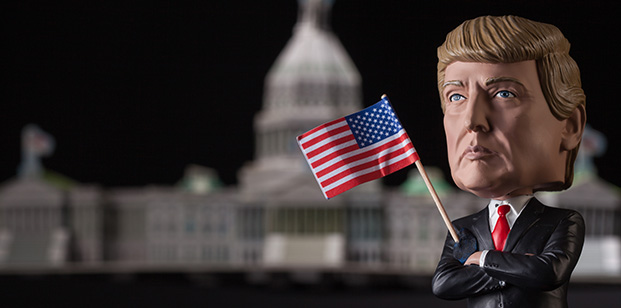Trump’s presidency has been a boost for markets – just not in the US.
- The expectation of Trump’s presidency has proved quite different to the reality
- Anti-Trump trades – gold, emerging markets – have done well
- Outside the Mag7, US markets have been lacklustre
It has been a year since Donald Trump’s victory in the Presidential election – and what a ride it’s been. Stock markets greeted his victory with a cheer, sending the already expensive US technology sector to new highs. However, it hasn’t quite panned out as many investors expected.
The expectation and reality of Trump’s presidency have proved quite different. Investors expected lots of market-friendly measures such as tax cuts and deregulation. In reality, these have played second fiddle to the tariff agenda, with its complex and destructive effects on global trade.
Many of the trades that have done best since Trump’s inauguration have been types of ‘anti-Trump’ options. For example, the astonishing rally in gold, up 48% over the past 12 months, appears to have derived from a desire among investors for a safe haven in response to a declining dollar and rising government debt.
Emerging markets have also been a success story, led by China. The MSCI Emerging Markets is around 6% ahead of the MSCI World over the past 12 months . The tariffs appear to have galvanised the Chinese government into economic stimulus, which has prompted a stock market rally. This is unlikely to have been the intention of Trump’s ‘Make America Great Again’ campaign.
Performance for US equities has been nothing special. Jason Hollands, managing director of Bestinvest, says the S&P 500 has been powered higher mostly by stellar gains for the Magnificent Seven stocks, and “even including their contribution the leading US index has actually lagged many other global indices, including the UK’s FTSE 100.”
He adds: “Without tech and telecommunications stocks, the S&P 500’s total return in the last 12 months looks positively pedestrian compared to other global indices at 8.6% (in GBP terms). If President Trump wants to take credit for the performance of financial markets since his re-election, then ironically, he appears to have made other equity regions – including some of those most heavily targeted by his tariffs – somewhat “Great Again”.”
The diversification trade that Trump has brought about is welcome for global investors. They needed a break from the focus on a handful of stocks in the US market. However, whether that was Trump’s intention at the start of his term is open to debate.









